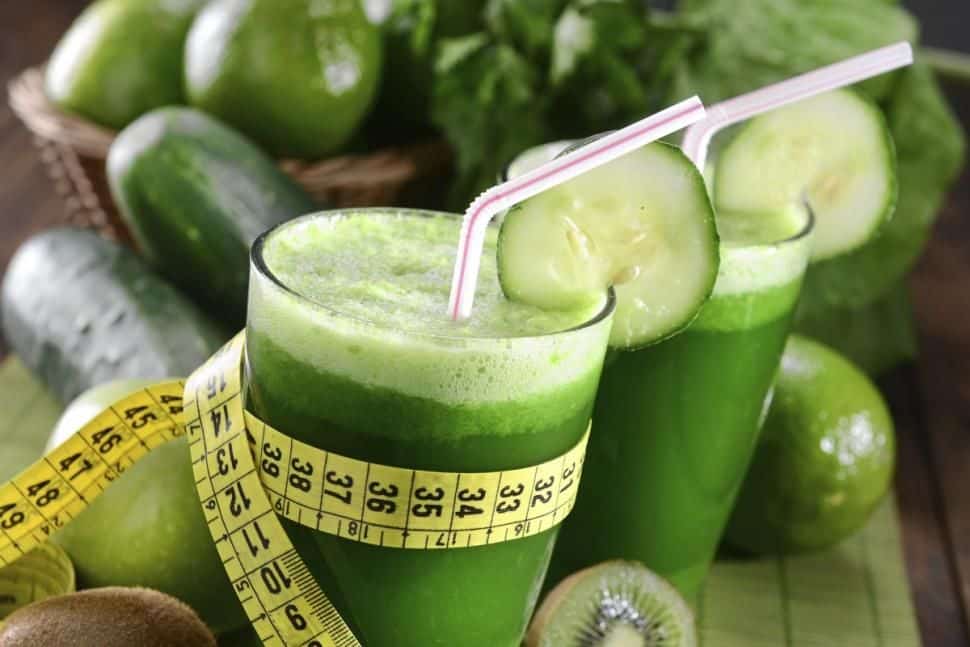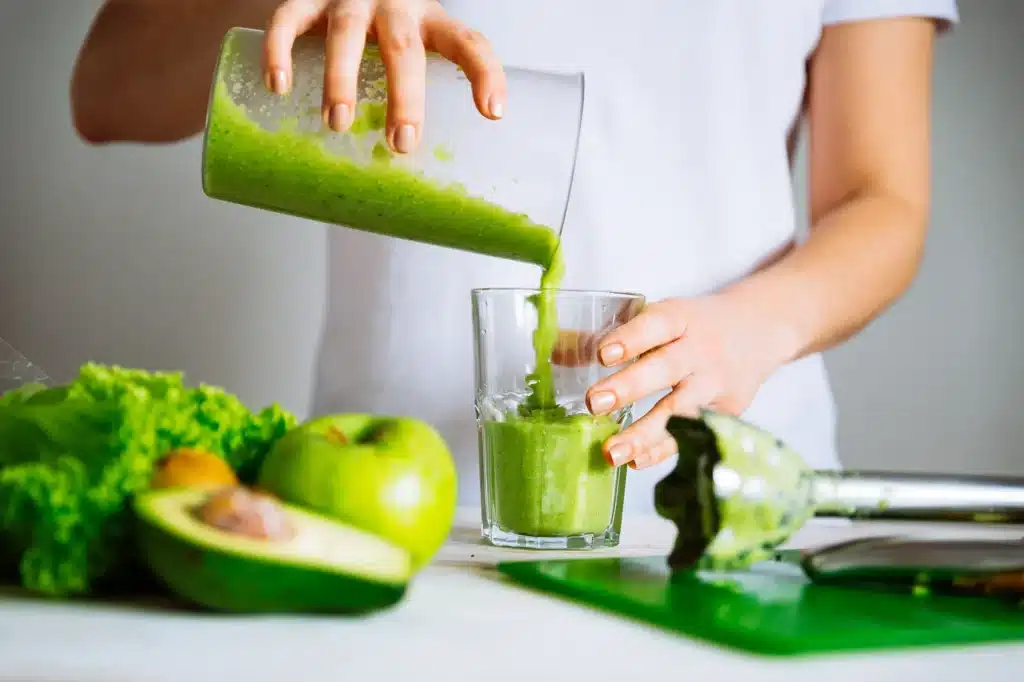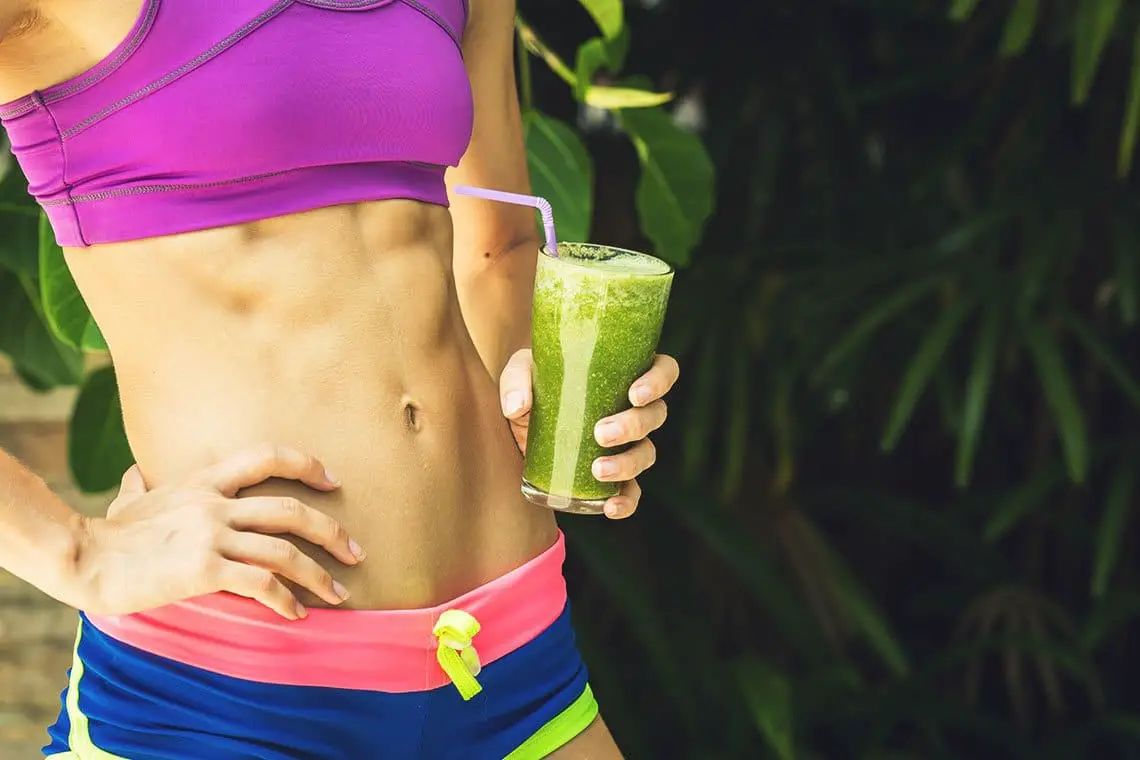Introduction
Is Juicing Or Smoothies Better For Weight Loss: Juicing involves extracting the liquid content from fruits and vegetables, leaving behind the fibrous pulp. This process concentrates the vitamins, minerals, and antioxidants present in the ingredients, providing a nutrient-dense beverage. Proponents of juicing argue that this method allows for rapid absorption of nutrients, claiming it can detoxify the body and promote weight loss. Advocates often emphasize the potential for a calorie deficit when replacing meals with fresh juice, leading to reduced calorie intake.
Smoothies involve blending whole fruits and vegetables, retaining their fiber content. This fiber aids digestion, keeps you feeling full, and stabilizes blood sugar levels. Smoothie enthusiasts argue that this sustained fullness can lead to reduced snacking and overall calorie consumption, potentially aiding weight loss efforts. Smoothies offer versatility, allowing the inclusion of proteins, healthy fats, and supplements to create balanced, satisfying meals.
While both juicing and smoothies have their merits, the choice between them depends on various factors, including personal preferences, nutritional goals, and individual lifestyles. Some individuals find juicing more appealing due to its perceived cleansing properties and the convenience of quick nutrient absorption. Others opt for smoothies because of their fiber content, which promotes satiety and supports long-term weight management.

Is juice or smoothie better for weight loss?
Smoothies have more calories. But they also contain more fiber and protein, which will leave you feeling full for longer and perhaps more likely to be able to stick to your calorie deficit. Juices have fewer calories so they may be easier to fit into your diet.
Fiber-Rich: Smoothies are made by blending whole fruits and vegetables, retaining their fiber content. This fiber contributes to a feeling of fullness and can help control appetite, making it easier to manage portion sizes and reduce overall calorie intake.
Satiety: The presence of fiber in smoothies helps stabilize blood sugar levels, preventing rapid spikes and crashes. This can reduce cravings for sugary snacks and help maintain energy levels throughout the day.
Customizability: Smoothies are highly customizable, allowing you to add ingredients like protein powder, Greek yogurt, or healthy fats (e.g., avocado or nuts) to make a balanced meal replacement. This versatility can make smoothies a valuable tool for weight loss.
Digestive Health: The fiber in smoothies supports healthy digestion, which can aid in weight management by promoting regular bowel movements and efficient nutrient absorption.
Why is juicing healthier than smoothies?
Juices can be as vitamin and mineral dense (sometimes more) as a smoothie. Juices are also a concentrated source of polyphenols. Polyphenols help protect the cells in your body from the oxidative damage that leads to chronic diseases like heart disease, type 2 diabetes, and cancer.
Nutrient Concentration:One of the primary reasons why juicing is often perceived as healthier is the concentration of nutrients. When you juice fruits and vegetables, you extract the liquid, leaving behind the fiber-rich pulp. This liquid contains a higher concentration of vitamins, minerals, and antioxidants per ounce compared to a smoothie made from the same quantity of produce. This means you can consume a more substantial amount of nutrients in a smaller volume.
Easier Digestion:Juicing removes the insoluble fiber from fruits and vegetables, making it easier for the body to digest. This can be particularly beneficial for individuals with digestive issues or sensitive stomachs. Without the fiber, the digestive system doesn’t have to work as hard to break down the food, allowing for faster absorption of nutrients.
Reduced Caloric Intake:Juices tend to be lower in calories compared to smoothies because they lack the fiber and other added ingredients like yogurt or nut butter. This can be advantageous for individuals aiming to reduce calorie intake for weight management or specific health goals.
Increased Micronutrient Absorption:The absence of fiber in juice can enhance the absorption of certain micronutrients. Fiber can sometimes bind to minerals like calcium, magnesium, and zinc, reducing their bioavailability. Without fiber interference, these minerals may be absorbed more efficiently from juices.
Can you lose body fat by juicing?
“I would not recommend juicing if someone wants to lose fat from their body and keep it off,” says Dana Hunnes, a senior dietitian at Ronald Reagan UCLA Medical Center. “Juicing may be effective for a quick loss of water weight, or bloat.
Loss of Muscle Mass: Extended periods of juice-only diets can result in the loss of lean muscle mass, which is not conducive to healthy, sustainable weight loss. Muscle plays a crucial role in maintaining a higher resting metabolic rate, and losing it can make it more challenging to maintain fat loss.
Nutrient Imbalance: Relying solely on juices may lead to nutrient imbalances. Juices can lack essential macronutrients like protein and healthy fats, which are crucial for overall health and maintaining lean muscle mass.
Metabolic Adaptation: Prolonged calorie restriction can lead to metabolic adaptation, where the body becomes more efficient at conserving energy. This can slow down your metabolism, making it harder to lose fat in the long run.
Lack of Satiety: Juices are low in fiber, which means they may not provide a sense of fullness or satiety that solid foods do. This can lead to increased hunger and potential overeating when returning to regular eating patterns.
Sustainability: Long-term juicing diets can be challenging to maintain due to their restrictive nature. Sustainable, healthy weight loss usually involves balanced, varied diets that you can maintain over time.
Which is healthier juicing or blending?
Assuming you want a diet in high fiber, blenders are the healthier option; that said, if you don’t have the stomach for a daily veg-filled smoothie or aren’t likely to make your own soups, a juicer packed with leafy greens will deliver plenty of nutrients and juices are easy to consume.
Nutrient Concentration: Juicing extracts the liquid from fruits and vegetables, leaving behind the fiber-rich pulp. This results in a beverage that is highly concentrated in vitamins, minerals, and antioxidants, which can be absorbed quickly by the body.
Low Fiber: The absence of fiber in juices can be beneficial for people with digestive issues, as it reduces the workload on the digestive system. It also allows individuals to consume a larger quantity of produce in a smaller volume.
Hydration: Juices are primarily composed of water, making them an excellent choice for staying hydrated while enjoying the benefits of essential nutrients.
Lack of Fiber: While low fiber can be an advantage for some, it’s a drawback for others. Fiber is essential for digestive health, satiety, and blood sugar regulation. Juices can lead to quicker blood sugar spikes due to their high sugar content without fiber to slow absorption.
Caloric Intake: Some juices, particularly those with a high fruit content, can be calorie-dense. Consuming excessive calories from juices without fiber can lead to weight gain.
Expense and Waste: Juicing can be expensive, as it requires a significant amount of produce to yield a small quantity of juice. There’s often a significant amount of food waste generated from juicing.
Can I drink 2 smoothies a day to lose weight?
Key Takeaways. Drinking two smoothies a day can provide benefits like increased fruit and vegetable intake, improved digestion, weight loss, and increased energy. However, drinking too many smoothies can lead to excess sugar and calorie intake, and nutrient imbalances.
Caloric Content: While smoothies can be a valuable part of a weight loss plan, it’s crucial to pay attention to the calorie content of your smoothies. Consuming two calorie-rich smoothies daily can result in an excess of calories, which may hinder weight loss rather than support it. Be mindful of portion sizes and ingredients to avoid excessive calorie intake.
Balanced Nutrition: For effective and sustainable weight loss, it’s essential to ensure that your smoothies provide balanced nutrition. Include a source of protein (e.g., Greek yogurt, protein powder), healthy fats (e.g., avocado, nuts), and a variety of fruits and vegetables to meet your dietary requirements.
Meal Replacement vs. Supplement: Consider whether the smoothies are meant to replace meals or serve as supplements to your regular diet. Replacing two meals with smoothies daily may not provide the necessary variety and balance of nutrients that a diverse diet offers. It’s generally to have at least one balanced whole-food meal per day.
Individual Needs: The effectiveness of drinking two smoothies a day for weight loss can vary depending on your individual metabolism, activity level, and overall diet. What works for one person may not work for another, so it’s essential to monitor your progress and adjust your approach as needed.
Consultation with a Healthcare Professional: Before making significant changes to your diet, especially if you have specific health concerns or conditions, it’s advisable to consult with a healthcare professional or registered dietitian. They can provide personalized guidance and recommendations tailored to your unique needs and goals.
How much weight can you lose in 3 days of juicing?
However, in the short term, people might see a loss of 1 to 2 pounds per day. A 5-8 pound weight loss with a 5 day juice cleanse is often achievable, however, we usually do not recommend long juice cleanses beyond 2-3 days. Remember, much of this weight loss is often due to losing water weight and muscle mass, not fat.
Water Weight Loss: In the initial days of juicing, you can expect to shed a significant amount of water weight. This is primarily due to the reduced intake of carbohydrates. Carbohydrates are stored in the body as glycogen, which binds to water. When you reduce your carb intake, your body releases glycogen and the associated water, resulting in rapid weight loss.
Reduced Caloric Intake: Juicing typically involves a substantial reduction in calorie intake compared to regular meals. This calorie deficit can contribute to weight loss. Calorie reduction is not sustainable over the long term.
Limited Fat Loss: While you may experience some fat loss during a 3-day juice cleanse, it is unlikely to be substantial. Most of the weight lost in such a short time frame comes from water weight and a decrease in food waste within the digestive system.
Metabolic Impact: Prolonged calorie restriction, such as that experienced during a juice cleanse, can lead to a temporary reduction in metabolic rate as the body adapts to conserve energy. This can make it harder to continue losing weight or maintain the weight loss once regular eating habits are resumed.
Which is better carrot juice or smoothie?
Whether it’s apple, orange, or carrot, juice contains negligible protein. Smoothies can run the gamut, but those made with Greek yogurt, milk, or protein powder usually provide a healthy dose of the muscle-building nutrient.
Fiber Retention: Unlike juice, carrot smoothies retain the fiber from carrots and other ingredients. This fiber promotes feelings of fullness, aids in digestion, and helps stabilize blood sugar levels.
Sustained Energy: The fiber in a carrot smoothie can provide a steady release of energy, preventing the rapid blood sugar spikes and crashes associated with juices.
Customizability: Smoothies allow you to customize your beverage by adding ingredients like Greek yogurt, protein powder, nuts, seeds, and other fruits and vegetables. This versatility can help you create a well-balanced meal or snack.
Digestive Health: The fiber in carrot smoothies supports healthy digestion and regular bowel movements.
Caloric Content: Depending on the ingredients you add, carrot smoothies can be higher in calories compared to carrot juice. It’s mindful of portion sizes if you’re watching your calorie intake.
Texture: Some people may not enjoy the texture of carrot smoothies, particularly if they are not blended thoroughly.
How many kg can I lose with smoothie diet?
Sgoutas also claims that the diet can boost weight loss. In fact, some testimonials displayed on the website claim that the plan led to up to 9 pounds (4 kg) of weight loss in just 3 days. The 21-Day Smoothie Diet is a 3-week diet plan that involves replacing two meals per day with smoothies.
Caloric Deficit: Weight loss occurs when you consume fewer calories than your body burns. A smoothie diet can create a caloric deficit if you replace meals with low-calorie, nutrient-dense smoothies. The extent of this deficit plays a crucial role in determining your rate of weight loss.
Rate of Weight Loss: A safe and sustainable rate of weight loss is generally considered to be about 0.5 to 2 kilograms (1 to 4 pounds) per week. Faster weight loss may occur initially, but it’s often a result of water weight and reduced glycogen stores.
Initial Weight Loss: Many people experience a more significant drop in weight during the first few days of a smoothie diet due to reduced calorie intake, decreased sodium intake, and water loss. However, this initial loss tends to stabilize over time.
Composition of Smoothies: The ingredients you use in your smoothies matter. Including a balance of macronutrients such as protein, healthy fats, and fiber can help you feel fuller and provide sustained energy, which can support long-term adherence to the diet.

Conclusion
Juicing provides a concentrated source of essential nutrients and antioxidants while allowing for rapid nutrient absorption. This can be advantageous for those seeking a quick and efficient way to boost their nutrient intake, potentially leading to reduced calorie consumption. However, the absence of fiber in most juices may lead to a lack of satiety, potentially causing overconsumption of calories from other sources.
Smoothies, on the other hand, retain the fiber content of fruits and vegetables, promoting feelings of fullness and stable blood sugar levels. This can be particularly beneficial for those looking to manage their appetite and make sustainable dietary changes. The versatility of smoothies also allows for the incorporation of proteins, healthy fats, and supplements, making them a well-rounded meal replacement option.
The key to successful weight loss lies not in the method chosen but in the overall dietary pattern and lifestyle. Both juicing and smoothies can be valuable tools in a balanced weight loss strategy, but they are not magic solutions on their own. The choice between juicing and smoothies for weight loss should be guided by personal preferences and the ability to sustain the chosen approach. It’s essential to consider individual needs, dietary restrictions, and long-term goals. Some individuals may find juicing a helpful way to kickstart their weight loss journey, while others may prefer the sustained fullness and balanced nutrition of smoothies.

